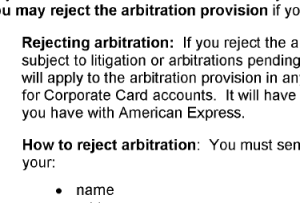American Express Tries To Sneak Forced Arbitration Clause On Users, Gives Until Feb. 15 To Opt Out Image courtesy of Good advice.
Hidden toward the back on AmEx customers’ October statement is a notice that “We are making changes to the process for resolving legal claims to provide more options.”
Except by “provide more options,” American Express actually means “take away the most vital option.”
On the first of the four pages dealing with claims resolution, it states that “our Claims Resolution provision includes an arbitration provision. This means that either you or we may choose to have an arbitrator decide any claim instead of having the claim decided by a court.”
But it’s not until a couple of pages later, you get to the meat of the matter:
“If arbitration is chosen by any party, neither you nor we will have the right to litigate that claim in a court or have a jury trial on that claim. Further, you and we will not have the right to participate in a representative capacity or as a member of any class pertaining to any claim subject to arbitration.”
So the first statement gives either party the right to enter into arbitration. But, per the second part, all it takes is for one party to holler “arbitration!” and all possibilities for an actual lawsuit go out the window.
How does this provide more options to the consumer?
It doesn’t. By not only forcing the customer into arbitration but also taking away all customers’ rights to join a class action, companies like American Express are shifting the balance heavily in their favor.
“By requiring an opt out, the companies have made the choice for consumers,” explains Public Citizen’s Christine Hines, “because consumers often accept default options in contracts.”
Adds Hines, “Consumers don’t enter into businesses or contracts with companies with the assumption that they’re going to sue them. We don’t really appreciate that right until we need it. American Express and others are aware of this and are using it against their customers.”
Thankfully, there is an opt-out period. For current customers, it is until Feb. 15, 2013. New AmEx customers will have 45 days from the date of their first purchase.
American Express has kindly provided a template for the rejection letter here.
It must be sent to
American Express
PO Box 981556
El Paso, TX 79908
Below is the important text of the template. You don’t have to use the AmEx template, but make sure that your rejection letter includes your Name, Billing Address, Account Number(s), the Date, and is signed. It also needs to be clear that you are rejecting the arbitration provision of the American Express Cardmember Agreement.
Arbitration Rejection Notice
I, [FULL NAME] , reject the arbitration provision of my American Express Cardmember Agreement.[Date] [Signature of American Express account holder]
[BILLING ADDRESS]
My American Express Account number(s): ____________-_________-_____________
“Requiring consumers to opt out of arbitration makes arbitration the default system,” says Hines. “Consumers shouldn’t have to select themselves out of the arbitration system. The court system should be default; after all it’s in the Constitution.”
Want more consumer news? Visit our parent organization, Consumer Reports, for the latest on scams, recalls, and other consumer issues.


